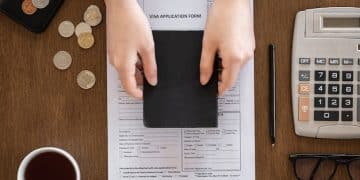Tax deductions for freelancers: what you need to know

Tax deductions for freelancers include home office expenses, business supplies, travel costs, and self-employment tax, which can significantly reduce taxable income when properly tracked and claimed.
Tax deductions for freelancers can significantly lighten your financial burden, but navigating them might feel overwhelming. Have you ever considered which expenses could save you money? Let’s uncover some essential insights.
Understanding the basics of freelance tax deductions
Understanding the basics of freelance tax deductions is essential for anyone working as a freelancer. Knowing what you can deduct helps you save money and stay compliant with tax regulations. Let’s break this down into manageable pieces.
What Are Freelance Tax Deductions?
Freelance tax deductions are expenses that freelancers can subtract from their total income to lower their taxable income. These deductions can significantly impact your overall tax bill. To qualify, an expense must be both ordinary and necessary for your work.
Common Deductions for Freelancers
Here are some of the most common deductions that freelancers can claim:
- Home office expenses
- Supplies and materials
- Internet and phone bills
- Professional development courses
The good news is that you can claim both direct and indirect expenses. Direct expenses are those that are solely for your freelance work, while indirect ones are related to your business but may benefit personal use too.
Keeping Track of Deductions
Keeping accurate records is crucial. Make sure to save receipts and invoices for all deductibles. You could use accounting software to make things easier. It helps in organizing your finances and ensures you don’t miss any potential deductions.
Additionally, set aside time each month to review your expenses. This habit saves you from a last-minute rush at tax time. Organizing your documents also simplifies the filing process, reducing the risk of missing important deductions.
As you dive deeper into your freelancing journey, remember that knowing the ins and outs of freelance tax deductions can lead to greater financial security and peace of mind.
Common tax deductions every freelancer should claim

Common tax deductions that every freelancer should claim can help maximize your savings during tax season. Knowing which expenses are deductible is vital for maintaining financial stability.
Home Office Deduction
If you work from home, you may be eligible for the home office deduction. To qualify, the space must be used exclusively for your freelance work. This can include a specific room or a designated area in a room.
Business Supplies
Every freelancer needs various supplies to get their work done. You can deduct the costs of supplies such as paper, pens, and even software subscriptions. Keeping receipts for these items is essential.
- Printing supplies
- Office furniture
- Software subscriptions
Another category includes equipment purchases. If you invest in a computer or other essential tools, these can often be depreciated over time, leading to significant tax savings.
Travel Expenses
If your work requires travel, you can deduct expenses incurred during these trips. This includes airfare, hotels, and transportation costs. Be sure to maintain detailed records of your travel itinerary and related expenses.
Meals during business trips can also be partially deductible, helping you save even more. Documenting these costs accurately will ensure you benefit fully from these deductions.
Understanding these common tax deductions can greatly aid in your financial planning and ultimately boost your profits as a freelancer.
How to keep track of deductible expenses
Keeping track of deductible expenses is crucial for freelancers aiming to minimize their tax burden. A solid system makes filing taxes easier and ensures you don’t miss any potential savings.
Organizing Receipts
Start by organizing your receipts as you acquire them. Use a dedicated folder or digital app to collect receipts related to business expenses. This practice will help avoid loss and confusion later.
Use Accounting Software
Investing in accounting software can significantly ease the tracking process. Many options allow you to input expenses, categorize them, and even generate reports. This can save you a lot of time during tax season.
- Popular software options include QuickBooks and FreshBooks.
- Look for features that suit your specific needs.
- Many apps also offer mobile versions, making it easier to track expenses on the go.
Even free options are available, which can work well for freelancers just starting out. By keeping digital records, you can simplify the process and keep a clear overview of your finances.
Regular Reviews
Set aside time each month for a quick review of your financial records. This will help you catch any missed deductions early on. Regular updates to your expense tracking not only keep things organized but also help you maintain a clear understanding of your financial health.
Consider creating categories for different types of expenses. For example, separate sections for office supplies, travel costs, and marketing expenses can clarify your overview. With proper tracking, you’ll be prepared to take full advantage of tax deductions at year-end.
Tips for filing taxes as a freelancer

Filing taxes as a freelancer can feel daunting, but with the right tips, the process becomes much simpler. Staying organized is the key to making sure you get everything done smoothly.
Understand Your Tax Obligations
Freelancers have specific tax obligations that can differ from traditional employees. You need to pay both income tax and self-employment tax. It’s essential to understand how much you owe at both federal and state levels.
Keep Detailed Records
Maintain accurate records of all income and expenses related to your freelance work. This includes invoices, receipts, and bank statements. Regularly updating your records helps prevent misunderstandings when tax season arrives.
- Use categories for different types of income and expenses.
- Track mileage if you travel for work.
- Consider using accounting software for organization.
Keeping everything documented makes it easier to file your taxes and supports your claims if you’re ever audited.
Estimate Your Taxes
As a freelancer, it’s wise to estimate your taxes throughout the year. Many freelancers use the estimated tax payment system to pay quarterly. This prevents a large tax bill at the end of the year and helps manage cash flow.
Check your earnings regularly so you can adjust your estimated payments as needed. This approach can relieve financial stress and make your tax responsibilities manageable.
If you’re unsure about specific deductions or tax benefits, consider consulting a tax professional. They can offer tailored advice and ensure you maximize your benefits while staying compliant.
In conclusion, effectively managing your taxes as a freelancer is vital for financial success. By understanding your tax obligations, tracking your deductible expenses, and staying organized, you can make the tax filing process less stressful. Remember to keep accurate records, estimate your taxes, and seek professional advice if needed. Following these tips will not only ease your tax worries but also help you maximize your savings. Stay informed and proactive to ensure a smooth tax season!
FAQ – Frequently Asked Questions about Tax Deductions for Freelancers
What are the common tax deductions freelancers can claim?
Freelancers can claim deductions for home office expenses, business supplies, travel costs, and professional development.
How do I keep track of my deductible expenses?
You can keep track by organizing receipts, using accounting software, and reviewing your finances regularly.
Do I need to pay estimated taxes as a freelancer?
Yes, freelancers typically need to pay estimated taxes quarterly to avoid a large tax bill at the end of the year.
Should I consult a tax professional?
It’s a good idea to consult a tax professional for personalized advice to maximize deductions and ensure compliance.





